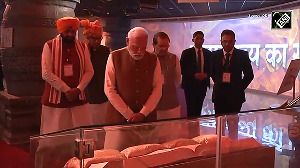Singapore's decision to open up its shores to casino gambling, formally announced on November 15, reflects market realities that it could no longer ignore.
Being a shoppers' paradise and a sanitised garden city wasn't good enough. Even though, over the years, the government had shed some of its notorious big brother attitudes, like the chewing gum ban or mandatory haircuts for anybody arriving at the airport with long hair, and Singapore had acquired a lot of glitz and glitter, there was real worry that tourist arrivals to the island-nation could suffer in the face of growing competition from Hong Kong and Macau.
When Macau broke up its casino monopoly about two years ago and threw the field wide open, the writing was up on the wall for Singapore. The casino option, much discussed but always avoided by Singapore's self-righteous authorities, could no longer be deferred.
As of now, two casino resorts are planned and rules for the first of them have been disclosed. It will be built on a 20.6-hectare site in Marina Bay, and 12 international firms, including Las Vegas biggies such as Harrah's Entertainment (reputedly the world's largest casino operator), Las Vegas Sands, MGM Mirage, Kerzner International, and Wynn Resorts, have been invited to submit proposals by March 29, 2006. The winner will be announced by the middle of the year.
To eliminate a bidding war and enable bidders concentrate on the quality of their proposals, the price of the land has been officially fixed at $1.2 billion. The winning operator will have to pay the government an annual casino fee of $12.5 million.
Merrill Lynch figures the development will cost no less than $3.1 billion, which would make the Marina Bay resort the costliest in the world.
The second casino resort will be built on a 35-hectare site on Sentosa Island and bidding for it is to begin in the first quarter of 2006.
Inherent in this decision is an admission of the fact that fun, aimed both at individuals and families, is as important for tourists as leisure, shopping, dining and wining, and has to be a major element in any tourism package.
It's fun on a grand scale that's fuelling the explosive tourist growth in Hong Kong and Macau, now a common destination for all practical purposes. This is what Singapore will now be seeking to offer.
But both Hong Kong, with its newly opened Disneyland theme park, and Macau, with its big-time gaming, are positioned so far ahead already that one wonders if Singapore can ever catch up.
Analysts say Macau's potential is astronomical as casinos there no longer depend on high-stake gamblers alone and have begun to attract mass-market punters from around the region.
Arrivals from the Chinese mainland alone went up 66 per cent in 2004. Of the 16.67 million who visited Macau last year, 9.5 million were from the mainland.
Last year's total casino turnover reached a dizzying $4.5 billion, overtaking Atlantic City and making Macau the second-biggest casino market in the world, only a notch behind Las Vegas' $5 billion.
Hot and hectic are the only words that can properly describe the Macau gaming market. Casino tycoon Stanley Ho's Sociedade de Jorge de Macau, which runs 16 casinos in the territory, including the famous Lisboa, is preparing to launch a $1 billion initial public offering of its shares.
His son, Lawrence, has teamed up with Australian Kerry Packer's PBL to build two expensive casino resorts, which will open over the next two years. PBL, which runs two Australian casinos - the Crown in Melbourne and Burswood in Perth - says it's worth losing high-roller customers back home to entrench its foothold in Macau.
It was the Las Vegas Sands Corporation that triggered the casino wave in Macau when it opened Sands Macau in May last year on a reclaimed area called Cotai Strip between the islands of Taipa and Coloane.
Some $12 billion worth of new casinos and hotels, including the mammoth, 3,000-suite, 10.5 million sq ft Venetian Macau, are coming up on this strip alone.
When completed by 2009, Cotai Strip will provide some 30,000 hotel rooms, about 1,000 gaming tables, and at least 30,480 sq m of convention space. Analysts predict it won't be too long before Macau goes past Las Vegas itself and emerges as the world's biggest casino market.
All this is bound to have an effect on other Asian countries. Thailand will now seriously consider legalising casinos in order to stay competitive in the tourism business. Japan will be tempted also to look at this increasingly attractive option. Others, like Cambodia and Malaysia, will surely want to upgrade the limited facilities that they now have. When all the chips are down, will the take for Singapore still be as big as its authorities expect it to be?





